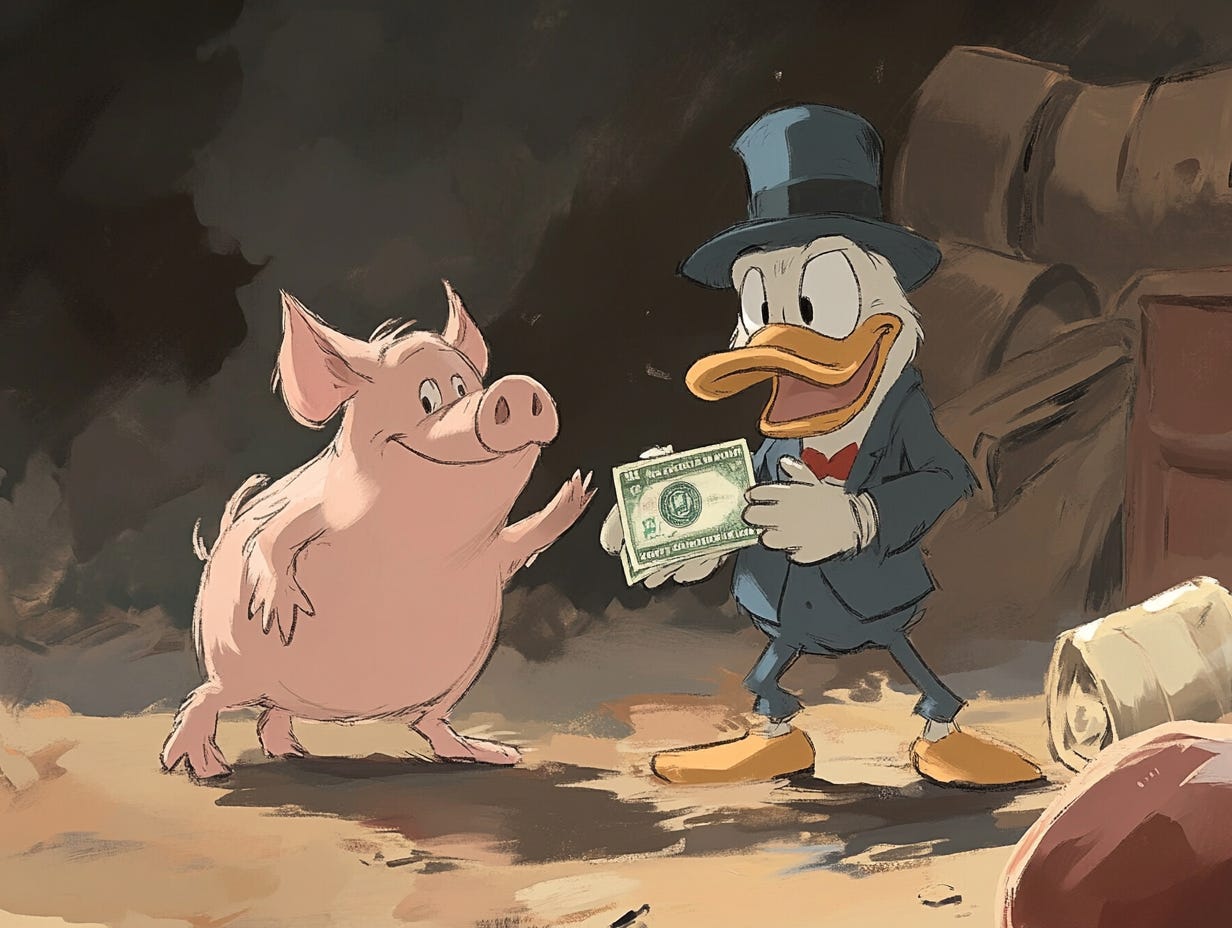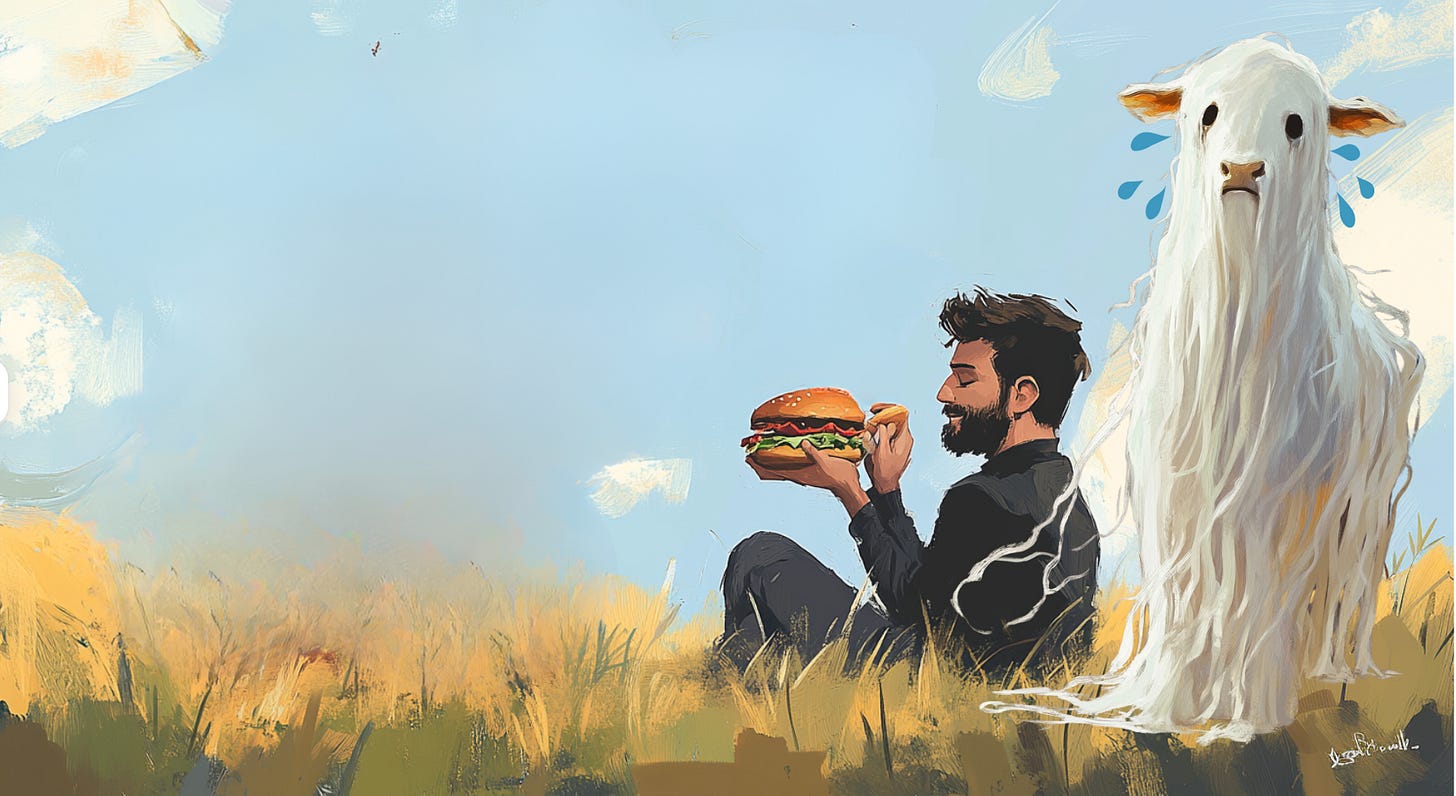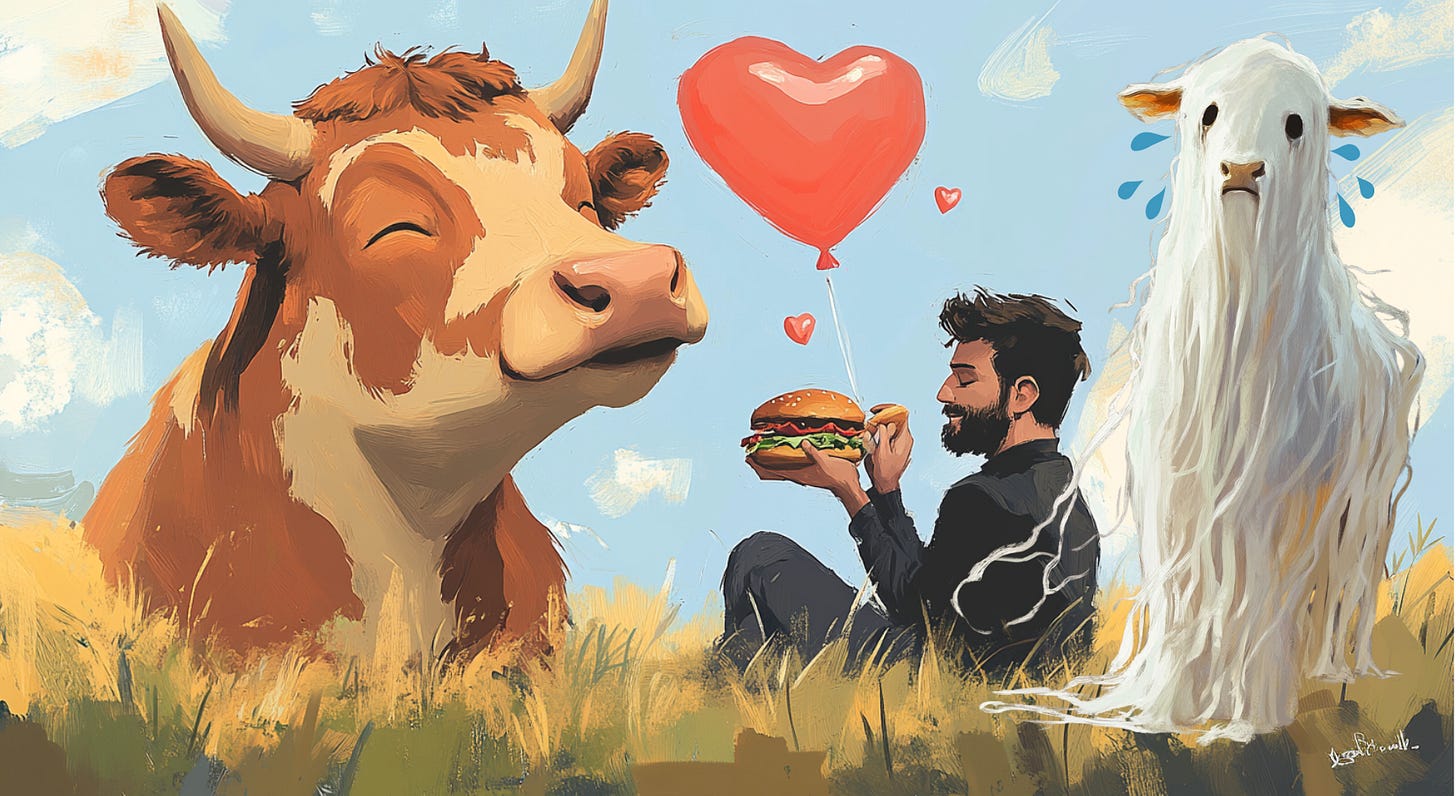The ethical cheat code you need: Offsetting your non-vegan diet
Don't let the perfect be the enemy of the good.
So, you're not vegan. But maybe you tried. Maybe you stood in the grocery store, cradling a carton of oat milk, whispering "this is my new life now." Then you spotted cheese, remembered joy, and crumbled like feta. Or maybe you got ambushed by a charcuterie board one week in and never looked back. Either way, whenever a cute animals hits you in the feels, you have an intrusive thought: "Am I... the villain?"
Let's cut to the chase: for many people, going vegan is hard. Your favorite foods betray you, your friends won't stop asking where you "get your protein," and suddenly you find yourself waking up in a cold sweat at 2am to google “how to make quinoa taste good”. As a result, many people are unwilling or unable to make lasting change.
Sounds familiar? Well you’re in luck. Offsetting your non-vegan diet is here to swoop in like the non-judgemental superhero you never knew you needed. And for the average American omnivore it costs just $23 a month. Think of it as a practical compromise for the ethically conflicted. If you can’t stop eating cheddar or chicken wings, you can at least donate to efficient animal charities while you’re at it.
It’s like being the Batman of factory farming, except instead of fighting crime yourself, you're paying specialists to do it for you.. and maybe you committed some of the crimes.. so perhaps it’s less Batman, and more Scrooge McDuck trying to reform his ways. Either way, doing something to assuage your guilt has never been so easy. Offsetting is like saying, "I acknowledge my weaknesses, but I'm outsourcing addressing the consequences, at least for now." It's a pragmatic approach to ethics that actually works.
The How
While you're munching on a bacon burger, your donations are out there protecting first hundreds, then thousands of animals. You're helping animals as much as going vegan, but without the hassle of eating kale. Think of it like carbon offsetting, but for animal welfare.
“But wouldn’t it be better to go vegan and donate to charities working to end factory farming?” Of course! It turns out doing more good deeds is better than less good deeds 🤯 But we shouldn’t let the perfect be the enemy of the good. If someone isn’t going to stop ‘bringing home the bacon’ any time soon, it’d be silly to let that stop them from starting to help in whatever way they’re willing.
“Isn’t this hypocritical?” Let’s be real — the animals you help don't care that you're still eating their cousins. Chickens aren't whispering, "wow, I was rescued by someone who still eats omelets. I feel so betrayed." They're just thrilled to not be crammed into a box the size of your carry-on luggage. The piglets you aren’t holding press conferences decrying the hypocrisy of your burger habits. They're just glad your donations protected them from the dystopic reality of factory farms.
Offsetting is the ultimate stop-gap solution. You can have your ribs and eat them too—just make sure your donation has saved ten pigs before you lick the sauce off your fingers. Sure, you're still eating meat, but you're also saving lives at scale, and that's more than most carnivores can say.
Offsetting vs. Veganism
Picture this. You're at brunch, mid-bite into a sausage roll, when your vegan friend levels you with the stare. You know the one—equal parts judgment and pity. In previous brunches they were right, but this time there's something they don't know, and instead of fumbling for excuses, you drop this revelation: “I might not be perfect, but my donations protected 1,000 animals last month”. Watch as their justified judgment is accompanied by reluctant respect. They may still find it “icky”, but the math is on your side. Donations can do just as much good for animals a going plant-based. Having two ways to help is better than having one.
Here's the wild truth that even the most committed vegans don't always consider: offsetting has some comparative advantages over diet change alone. Think about it:
Your impact ceiling is limitless. Go vegan and you spare roughly 255 animals a year. Impressive! But donate enough and you could save 1,000 animals. Or 10,000. There's no upper limit to how much good you can do, if your wallet is willing.
You can make amends for your past. Diet change only helps animals going forward. It can't help the ones already affected by your old cheeseburger habit. Offsetting? It's like moral time travel. You might not be able to literally help the same animals your past self impacted, but you can do the same amount of good today — the next best thing. Even vegans can use this to clean their pre-enlightenment slate.
You're funding systemic change. Individual dietary choices, while admirable, are just that — individual. Donation dollars can fund lobbyists fighting for animal welfare legislation, corporate campaigns pressuring entire industries to change and scientists cooking up real meat in labs so you can enjoy your steak but skip the slaughterhouse. You're not just taking your business elsewhere, you're actively transforming the system.
It's sustainable for most people. Let's be honest: the five-year retention rate for veganism isn't great. Many people try, slip up, and abandon ship entirely. But a set-and-forget monthly donation? That's something most people can stick with for the long haul. And a consistent donor over decades will save more animals than someone who goes vegan for six months then gives up.
So while your vegan friend's quinoa bowl and moral superiority are certainly commendable, your donation dollars can do as much good, or — if you’re willing — even more. Sometimes the person with bacon on their plate and charity receipts in their inbox is doing more for animals than the one with the Animal Liberation t-shirt and oat milk latte (and I say this as someone in the latter group).
So stop agonizing. Not ready to trade beef burgers for portobello mushroom ‘patties’? Fine. Offset instead. Direct some money to an effective animal charity, save thousands of lives, and keep enjoying mac and cheese with slightly less guilt. Because if you're going to compromise on your ethics, at least compromise in a way that makes the world dramatically better. It's not perfect, but neither are you—and the cows don't need your perfection. They just need your help.
The ethical fine-print
Don't worry, I'll keep it brief.
I’m not claiming that eating meat and offsetting is morally equivalent to not eating meat at all. It might be equivalent — I’m not sure… See a couple blogs about this question here and here. However this question isn’t really all that relevant. The vast majority of people are not willing to change their diet right now, despite the best efforts to persuade them.
The key question isn't whether donating while eating meat is as good as going vegan (since almost no one who offsets was otherwise going to change their diet). The question is whether eating meat and donating is better than eating meat and not donating — which is hard to deny.
Thanks for reading!





Aiden, thanks so much for continuing to argue for practical, pragmatic ways of making a difference.
My concern, after being vegetarian for almost 40 years and being in advocacy for over 30, is that I don't see any indication *in the actual per-capita consumption numbers* of paying for advocacy working.
A specific look at data (first quote): https://www.mattball.org/2024/11/for-your-consideration-exchange-re.html
Actual meat reduction and an increase in per-capita animal consumption: https://www.onestepforanimals.org/blog/meat-reduction-hurts-animals
I think this might be a better cheat code. https://www.onestepforanimals.org/about.html
Or not. TY again for avoiding the "GO VEGAN OR GO F YOURSELF" mindset.
You should be vegan and offset, because the goal isn't offsetting your bad deeds with good deeds, that's not how morality works, it's not accounting. The goal is maximizing the good.
I can understand someone who tries in earnest to go vegan and has difficulty, isn't perfect, makes exceptions etc. I know people like that and I show them grace and I encourage them because that's the right thing to do.
But if someone said to me that they think their "offsetting" absolves them of the wrongdoing they commit, or that there's some cancelling out of these two acts - I'm sorry but that's moronic. Even the Catholic Church got rid of indulgences in the 16th century.